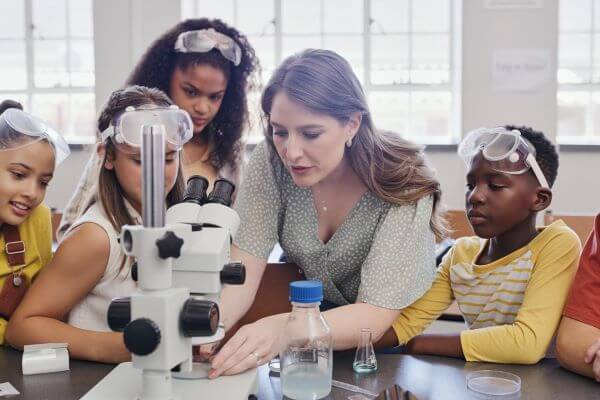
Jason Terk, MD, calls it an honor to have nominated and seen a mentor win the Ernest and Sarah Butler Awards for Excellence in Science Teaching.
Jan Jones, his freshman biology teacher at Jesuit College Preparatory School of Dallas, received a distinguished honor from the Butler Awards in 2014. Ms. Jones’ enthusiasm and engaging style helped him envision a professional path in medicine, Dr. Terk says.
“Having somebody who connects with you in a meaningful way and inspires you in such a way that you have a vision beyond your present moment” enables “see[ing] yourself doing something that you wouldn’t have otherwise imagined,” said the Fort Worth pediatrician and chair of the Texas Medical Association’s Council on Constitution and Bylaws.
With applications open for the Ernest and Sarah Butler Awards for Excellence in Science Teaching, physicians are invited to nominate outstanding Texas elementary, middle, and high school science teachers.
Established in 1990 and funded by the TMA Foundation thanks to an endowment established by Dr. and Ms. Ernest C. Butler of Austin, the Excellence in Science Teaching Awards spotlight the vital role that educators play in shaping the aspirations of future physicians.
There are three categories of awards, with up to $62,000 given annually to recipients and their schools:
- The Grand Prize Award of $20,000 and a $5,000 resource grant for the recipient’s school science curriculum;
- Three Distinguished Award winners each receive $7,000 and another $3,000 for their schools; and
- One Rookie Award winner, for a teacher who has taught less than seven years, receives $5,000 plus $2,000 for his or her school.
Applications are open for the current Butler Awards cycle through Jan. 4, 2026. Candidates and nominators can learn more about the awards’ criteria and apply or nominate an educator here.
Joseph Parthemore, who teaches fifth grade math and science in Grapevine, says the Butler Award he won this year directly impacts how his students see science.
The resources furnished by the award funds make his classroom “feel more like a working lab than a space limited to textbooks, which keeps engagement and excitement high,” he said. “Beyond materials, the award has sent a powerful message to my students that their learning matters and that scientists, physicians, and leaders in the Texas community believe in their potential. That motivation is invaluable, and it has already inspired students to talk about future careers in engineering, medicine, and environmental science.”
Mr. Parthemore is also using his award to fund his students’ study of heat transfer as it relates to endangered African penguins.
“By encouraging empathy and asking them to imagine what it means for a penguin chick to survive in a warming climate, [the students] begin to see how their learning has a purpose in the real world. These connections help them become problem solvers, collaborators, and compassionate thinkers,” Mr. Parthemore said.
Joe Ferrara, EdD, another 2025 Butler Award honoree, teaches biology and environmental science to ninth and 10th graders at All Saints’ Episcopal School in Fort Worth. The funds his school received as part of his award have enabled a yearlong herpetology elective course with a classroom collection of nearly 100 snakes – plus a green keel-bellied lizard and a red-footed tortoise.
In the class and a related club at the school, students practice close observation of the animals. The scientific attention to detail means “students apply biology concepts in real time, translating abstract ideas into practical care,” Dr. Ferrara said. “When students learn to observe carefully, think critically, and care for living systems, they carry those skills into every career and life path.”
Jessica Ridge
Reporter, Division of Communications and Marketing
(512) 370-1395